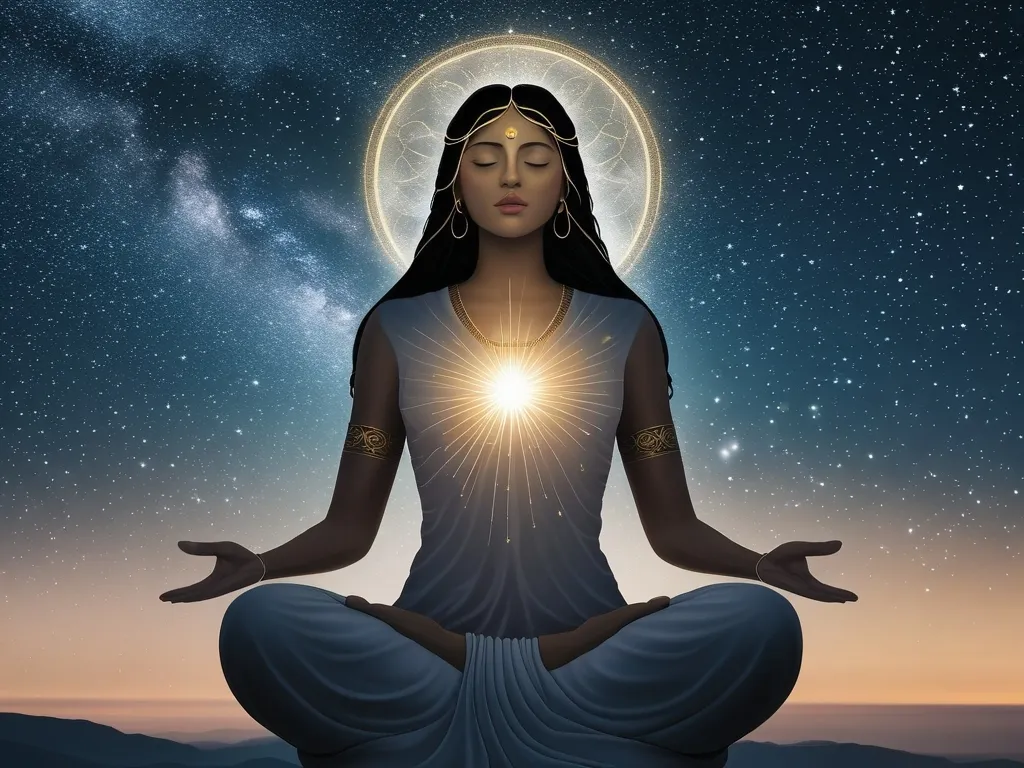In the vast and intricate tapestry of Hindu philosophy, there exists a goddess who often slips under the radar, yet plays a pivotal role in the balance of our lives: Nidra, the Goddess of Sleep. While the grand narratives of Hindu mythology are filled with tales of mighty gods and epic battles, Nidra’s story offers a unique and profound insight into the importance of rest, reflection, and renewal.
To begin with, let’s delve into the origins and significance of Nidra. In Hindu scriptures, Nidra is not just a physical state but a divine entity with her own persona and powers. She is often depicted as an aspect of Mahākālī, one of the three primary forms of Devī, and is associated with the universal energy known as tamas.
One of the most fascinating stories involving Nidra comes from the Devi Mahatmyam, a part of the Markandeya Purana. Here, Nidra is described as a goddess who resides in the eyes of Vishnu, the preserver of the universe. When Brahma, the creator, is threatened by the demons Madhu and Kaitabha, he invokes Nidra to leave Vishnu’s eyes, allowing him to awaken and save Brahma. This narrative highlights Nidra’s critical role in the cosmic balance, showing that even the gods need rest to perform their duties effectively.
Another compelling tale involving Nidra is found in the Ramayana. Here, she plays a crucial part in the story of Urmila, the wife of Lakshmana. When Lakshmana decides to accompany Rama into exile, Urmila is asked to stay behind. However, to ensure Lakshmana can fulfill his duty without sleep, Nidra approaches Urmila and induces her into a deep sleep that lasts for 14 years. This selfless act by Urmila, facilitated by Nidra, allows Lakshmana to remain vigilant and ultimately contribute to the victory over Ravana.
These stories illustrate the delicate balance between action and rest that Nidra represents. In a world where constant activity and productivity are often valorized, Nidra’s role reminds us that moments of pause are essential for rejuvenation and effectiveness. This theme is not limited to mythological tales but is also reflected in the philosophical texts of Hinduism.
In the Vedas and Upanishads, sleep is not merely seen as a physical necessity but as a state of spiritual potential and introspection. The concept of nidra is linked to the deeper states of consciousness, where the mind enters a state of deep relaxation, allowing for spiritual growth and self-realization. This is evident in the description of nidra as one of the five mystic states in the Īśvarapratyabhijñāvimarśinī, where it is associated with the direct experience of liberation-in-life.
Nidra’s significance extends beyond the realm of mythology and philosophy to the practical aspects of daily life. In Hindu tradition, sound sleep is considered essential for maintaining good health. The three dhatus (basic humors of the body) need to be in equilibrium for good health, and sleep plays a crucial role in achieving this balance. It is said that good sleep comes easily to those who are healthy and pure in heart, while it eludes those stricken by poverty, disease, or immorality.
The worship of Nidra is also an integral part of Hindu practice, especially for those suffering from sleeplessness or other related issues. There are specific mantras and prayers dedicated to Nidra, which are believed to invoke her blessings for a peaceful and restful sleep. For instance, the mantra “Om Mata Nidra Deviyai Namaha” is recited to seek her grace and ensure proper sleep, which is essential for daily routines and overall well-being.
In addition to her role in individual health, Nidra is also associated with the broader cosmic order. She is sometimes depicted as the wife of Kālāgnirudra, an aspect of Rudra or Śiva, highlighting her connection to the destructive and transformative forces of the universe. This association underscores the cyclical nature of life, where rest and activity are interwoven to maintain balance and harmony.
As we navigate the tumult of modern living, the teachings of Nidra offer a fresh perspective on how to balance effort with ease. In a world that often celebrates constant activity and neglects the importance of rest, Nidra’s story serves as a reminder that moments of pause are vital for our well-being. By embracing the concept of nidra, we can learn to prioritize rest and reflection, leading to a more balanced and fulfilling life.
In my own journey, I have found that understanding Nidra’s significance has helped me appreciate the value of rest. In a society that often equates productivity with worth, it’s easy to overlook the importance of sleep and relaxation. However, by incorporating Nidra’s teachings into my daily routine, I have found a deeper sense of calm and clarity. Whether it’s through meditation, a good night’s sleep, or simply taking a moment to pause during the day, I have come to realize that rest is not a luxury but a necessity.
As we explore the tranquil realm of Nidra, we are invited to reconsider our relationship with sleep and rest. In a world that is increasingly fast-paced, Nidra’s gentle embrace offers a comforting reminder that even amidst chaos, moments of pause are essential. By honoring the Goddess of Sleep, we can find a deeper sense of peace and strength, guiding us through the challenges of modern life with inner calm and clarity.
In conclusion, Nidra’s story is a powerful reminder of the importance of balance in our lives. Through her, we learn that rest is not just a physical necessity but a spiritual and philosophical one as well. As we delve into the narratives and teachings surrounding Nidra, we uncover a profound wisdom that encourages us to prioritize rest, reflection, and renewal. In doing so, we can navigate the complexities of our modern world with a sense of inner peace and strength, guided by the gentle and transformative force of the Goddess of Sleep.






